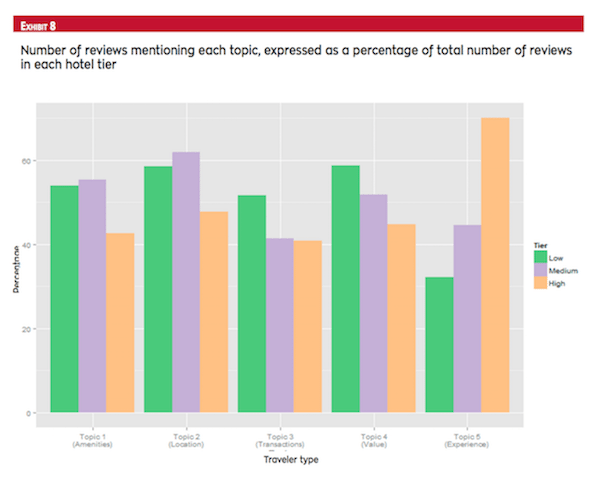Skift Take
If hotels really want to know what guests think of their hotel, looking at the ratings isn’t enough.
That online hotel reviews are extremely important—both for potential guests and hotel management—is undisputed, but to really improve hotel operations, looking at numerical ratings isn’t enough.
It also doesn’t help that there are thousands of reviews for hotel operators to mine through—making it that much harder for them to read through each and every one.
Researchers at Cornell University’s Center for Hospitality Research recently developed a text-mining method for analyzing online customer reviews of hotels and found that the reviews don’t always tell the whole story.
While there are a few companies that provide automated software programs for analyzing those text reviews, like Fishbowl Analytics and ReviewPro, for example, this particular study used natural language-processing algorithms to try to find real-world applications for a sample of online hotel reviews.
“Uncovering insights that have real service and managerial implications distinguishes this project from other text-mining and natural language processing works,” says Shawn Mankad, assistant professor of operations, technology and information management at the Samuel Curtis Johnson Graduate School of Management and one of the study’s authors.
The study, “What Guests Really Think of Your Hotel: Text Analytics of Online Customer Reviews,” analyzed text from 5,830 TripAdvisor English-language reviews for 57 different hotels in Moscow from 2012 to 2013 and found the following:
Negative comments carry a lot more weight in a guest’s rating of a hotel than positive comments do, meaning that an average of positive and negative scores in numerical ratings doesn’t provide a clear view of a guest’s opinion.
It’s better for a hotel to provide a moderately good overall experience on a consistent basis, than to have extremely good and extremely bad reviews at the same time. “The terrible service will outweigh the good feelings from the stay’s excellent aspects,” Mankad says.
When it comes to hotel amenities, breakfast, the bed, and Wi-Fi are important. The top five terms most likely to be used when describing amenities in online reviews are breakfast, free, food, bed, and Wi-Fi.
When guests write about the location of a particular hotel, the most used terms include metro, walk, location/located, station, and clean.
In describing the overall experience of a stay, the most common terms used tended to be generally positive: great, staff, service, excellent, and recommend were in the top 10.
Business travelers leave the most online reviews. More than 40 percent of reviews left for all types of hotels were written by business travelers. Couples came in second in terms of the number of reviews written.
Customers value different things from different types of properties. Seventy percent of reviews for high-tier hotels mentioned the overall experience, while only 32 percent of low-tier hotel reviews and 45 percent of middle-tier hotel reviews included comments about experience. Amenities and location were mentioned more often in reviews for middle-tier motels compared to hotels in low and high tiers. Hotels in the low tier had more reviews related to transactions and value compared to those in the middle and high tiers.
The study’s authors suggest hotel operators view online reviews as complementary to traditional guest satisfaction surveys, and to use text-mining methods to analyze them, paying special attention the type of guest and what that type of guest wants in a hotel stay. “This suggests that information from the text can potentially yield insights not indicated in the ratings for how hotels can improve their operations and better meet customer expectations,” the study’s authors wrote. “Guests’ true feelings are found in those comments—particularly if they write lengthy reviews that focuses tightly on just a few issues.”
Sites like TripAdvisor that ask hotel guests to submit online reviews should encourage more guests to write reviews, ask for more information related to their stay, and have tools that ensure the quality of those reviews.
If you’re a potential guest looking at other customers’ reviews to determine whether or not you should book at a particular hotel, don’t just look at the ratings—it pays to read the reviews, too.
If you’re writing an online hotel review, being explicit about your sentiments—good or bad—and including your thoughts about amenities, location, value, transactions, and overall experience, will make your review that much more influential, and helpful, to hotel operators.
Have a confidential tip for Skift? Get in touch
Tags: digital travel research, hotel, online
Photo credit: Thorough analysis of online hotel reviews, like those found on TripAdvisor, is important for improving hotel operations. TripAdvisor


